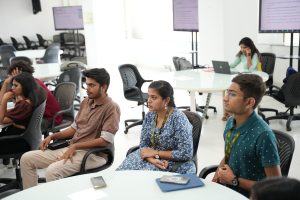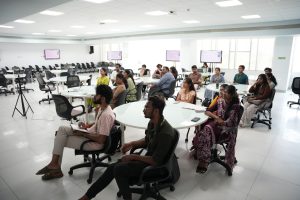Dr Soni Wadhwa Publishes Paper on Digital Libraries for Minor Languages in India
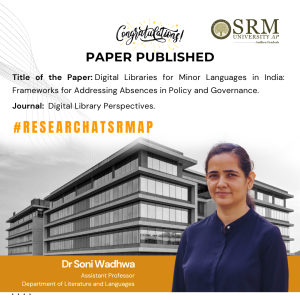 In a significant academic achievement, Dr Soni Wadhwa, Assistant Professor in the Department of Literature and Languages, has recently published a paper titled “Digital Libraries for Minor Languages in India: Frameworks for Addressing Absences in Policy and Governance.” The paper was published in the esteemed Journal Digital Library Perspectives. Dr Wadhwa’s research illuminates the importance of establishing digital libraries for minor languages in India and proposes frameworks to address existing gaps in policy and governance. This pioneering work not only explores the significance of preserving linguistic diversity but also advocates for inclusive and accessible digital resources for all.
In a significant academic achievement, Dr Soni Wadhwa, Assistant Professor in the Department of Literature and Languages, has recently published a paper titled “Digital Libraries for Minor Languages in India: Frameworks for Addressing Absences in Policy and Governance.” The paper was published in the esteemed Journal Digital Library Perspectives. Dr Wadhwa’s research illuminates the importance of establishing digital libraries for minor languages in India and proposes frameworks to address existing gaps in policy and governance. This pioneering work not only explores the significance of preserving linguistic diversity but also advocates for inclusive and accessible digital resources for all.
The publication of this paper not only adds to Dr Wadhwa’s scholarly contributions but also highlights the commitment of SRM University-AP faculty members to engaging in research that can have a positive impact on society.
Abstract
This study aims to deliberate on strategies for enlisting community support for gathering diverse learning resources in different languages and for enlisting participation in activities such as crowdsourcing in initiatives such as annotations and transliteration. This paper calls for interventions that imagine and create infrastructure for the flourishing of smaller libraries that can draw from and feed into large-scale national and international libraries. Offering a conceptual framework to rethink the country’s approach toward minor languages, it first offers an overview of policies and initiatives relevant to the concerns of minor languages in digital libraries in India. Based on the policy analysis, it then goes on to suggest starting points for policy designers and custodians of libraries to help them work toward better representation of languages in their resources.
The existing frameworks analyzed here for the greater or representation of minor Indian languages reveal a culture of silence toward the issue of language. With some advocacy, these frameworks can be mined to craft different ways that are critical not just for enriching libraries but also for preservation of cultural heritage of the communities concerned, thus adding a larger social dimension to the question of access.
Explanation of the Research in Layperson’s terms
Given that Indian languages in general are under-represented on the internet and that languages of minority linguistic groups find very little space on digital platforms, it is imperative for institutions such as libraries to cater to smaller communities and their educational needs while also reaching out to them in their own languages. While a lot of socio-political discourse on minority languages in India exists, this study pushes for their bearing on digital libraries, educational frameworks and cultural heritage. It offers five suggestions for strengthening the presence of minor languages in digital libraries in India.
Details in citation format
Wadhwa, S. (2024), “Digital libraries for minor languages in India: frameworks for addressing absences in policy and governance”, Digital Library Perspectives, Vol. ahead-of-print No. ahead-of-print. https://doi.org/10.1108/DLP-01-2024-0002
Practical Implications
This viewpoint paper can be used to enhance policy and governance around libraries. With National Education Policy 2020, which emphasises the importance of learning in regional/mother/Indian languages, Indian educational system as well as social institutions need stronger platforms to make resources in Indian languages available to students as well as lifelong learners. With more of such research, it will be possible to come up better digital infrastructure for Indian languages.
Social Implications
Indian languages are not widely represented on the Internet and in the knowledge set up. Making existing resources and knowledge available in digital libraries will stimulate further research on generating further research and knowledge production in Indian languages. It is hoped that more research in the domain of Indian languages works towards the digital divide and knowledge divide in India.
Collaborations
This research came out of the researcher’s previous archival work. Her digital archive PG Sindhi Library is dedicated to post-partition Sindhi writing in India. This article is based on an invited talk delivered at the international symposium titled “Digital Libraries: Sustainable Development in Education” held at IIT Kharagpur in India in November 2023. The author is grateful to the organisers and fellow participants for their feedback.
Future Research Plans
The researcher is involved in a sanctioned project titled “Sindhi Sanchaya: Building a Comprehensive and Interactive Database of a Partitioned Literature” funded by IIT Indore. She hopes to build on this work produced in this article as she makes progress in the project.
- Published in Departmental News, English Current Happenings, News, Research News
A Crash Course in Decoding Language with Ms Andalib Mahmud
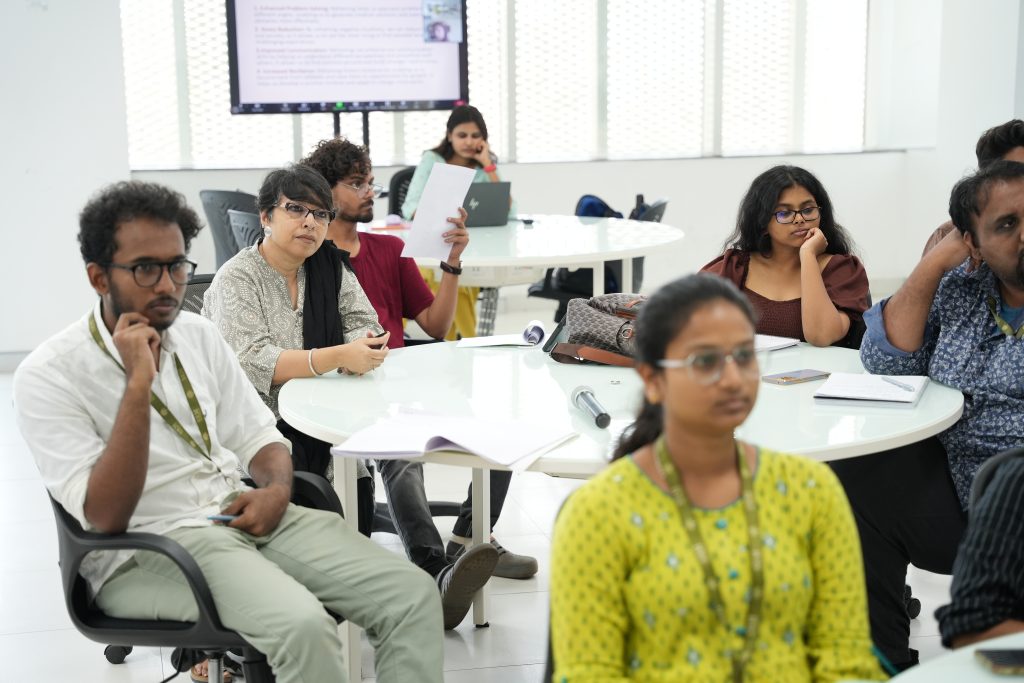
The Department of Literature and Languages invited Ms Andalib Mahmud, distinguished psychologist and master practitioner and trainer of Neuro-Linguistic Programming (NLP), to deliver an insightful guest lecture at SRM University-AP to students enrolled in the open elective course “Decoding Language,” taught by Dr Srabani Basu on May 02, 2024. Ms. Mahmud captivated the audience by elucidating the theory and practice of ‘reframing,’ a behavioural intervention technique utilised in NLP. She expounded on the intricacies of reframing, its techniques, objectives, and efficacy in modifying behaviour patterns. To enhance understanding, Ms Mahmud engaged the students in stimulating group activities, transforming the lecture into an experiential learning session.
The event not only provided students with theoretical knowledge but also offered practical insight into the application of NLP techniques. Ms Mahmud’s expertise and engaging teaching style left a lasting impression on the students, enriching their understanding of language decoding and behavioural interventions. The lecture was a resounding success, inspiring students to delve deeper into the field of NLP and its applications in language and communication.
- Published in Departmental News, English Current Happenings, News
Reimagining Island Poetics: Seminal Research on N S Madhavan’s Novel
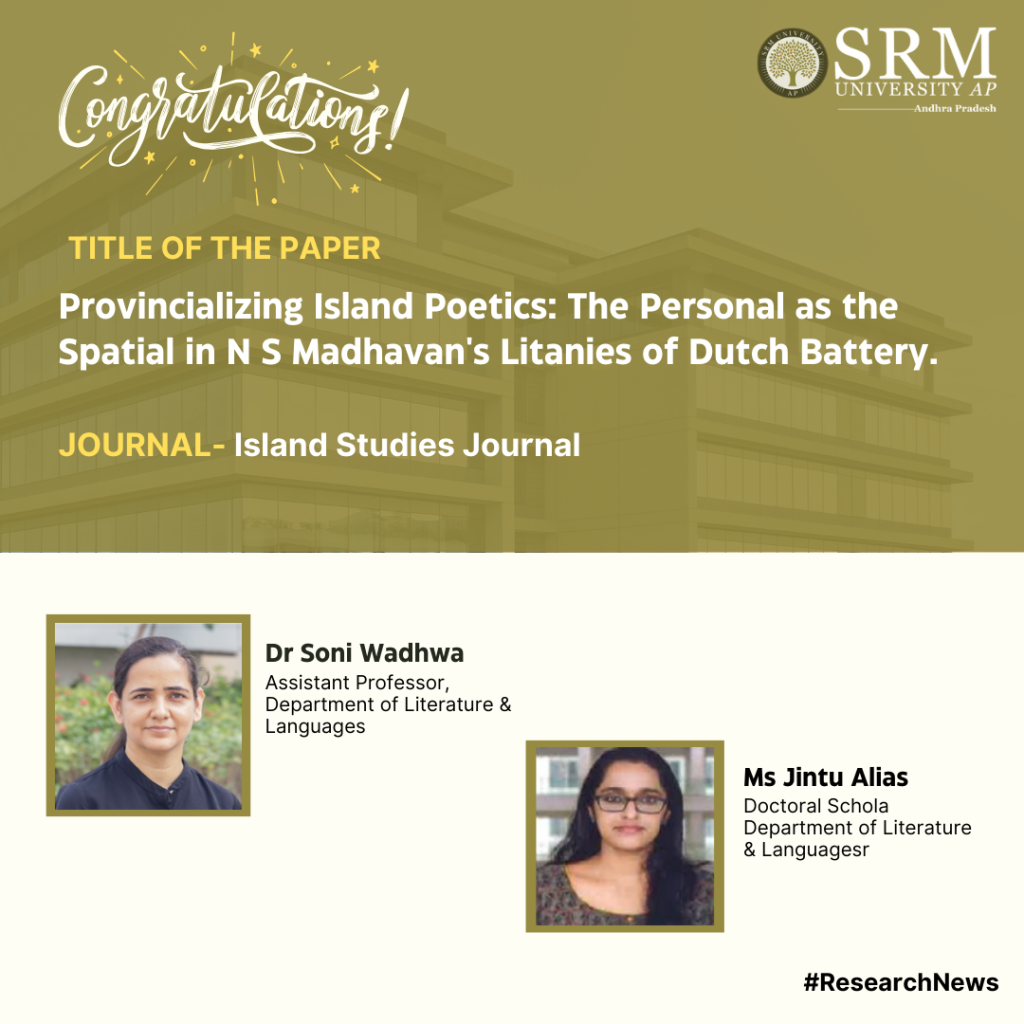
Dr Soni Wadhwa, Assistant Professor at the Department of Literature and Languages and her research scholar, Ms Jintu Alias, from the Easwari School of Liberal Arts at SRM University-AP, have published their seminal research paper titled “Provincialising Island Poetics: The Personal as the Spatial in N S Madhavan’s Litanies of Dutch Battery.”
Their research delves into the intricate relationship between personal experiences and spatial representations, challenging traditional island narratives. Focusing on the island city of Kochi and its rich history of cosmopolitanism, they aim to draw attention to alternative island spaces in India and Asia. Furthermore, they are convinced that their work will inspire further studies and creative writing on cultural traditions in smaller Indian island cities, highlighting the diverse themes and settings that are yet to be explored in Indian literature.
Abstract
Affect towards islands is a unique approach to engage with in discussions of the phenomenology of fictional islands. This affect complements the already identified tropes within island poetics: those of sensorial exploration, spatial practices, and textural detailing of islands. This article turns to a work of fiction about a fictional island based on the island city of Kochi in south India to unpack an alternative aesthetic of spatiality, the kind that changes the personal/political relationship to personal/spatial one. We argue that the novel, Litanies of Dutch Battery (the novel in question) by N.S. Madhavan, expands inquiries into phenomenology of fictional islands by making space for corporeal memory and collective memory in storytelling. These memory-oriented narrative devices, we suggest, “provincialize” island poetics to add a hermeneutic of postcolonial angst to the repertoire of formal features of literary islandness.
Link to the Article
https://doi.org/10.24043/001c.94614
We wish the pair continued success in their future endeavours!
- Published in Departmental News, English Current Happenings, News, Research News
Tracing a Translator’s Journey: An Interview with V Ramaswamy
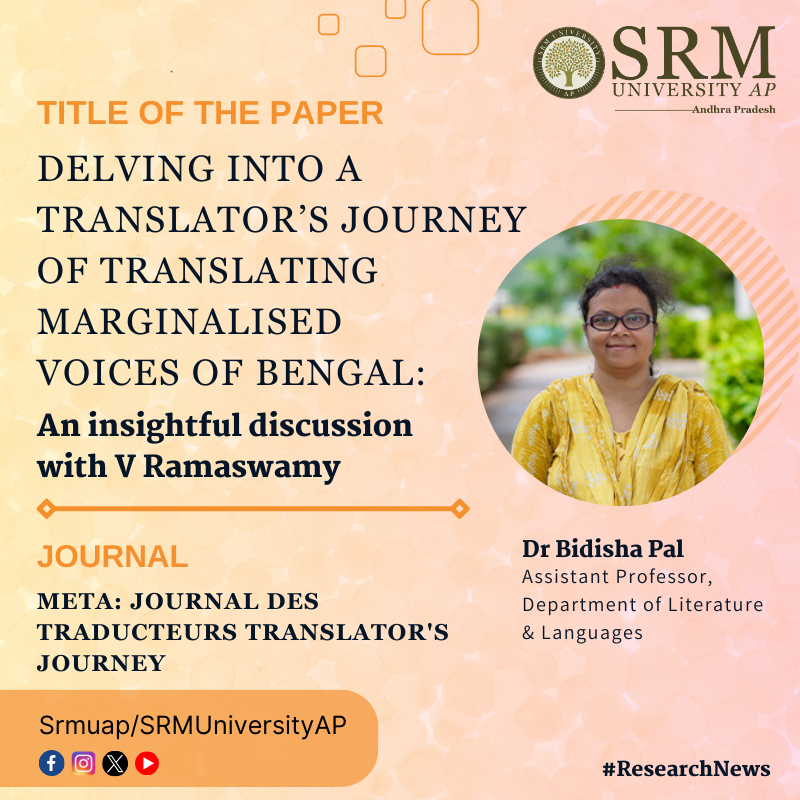
A translated work must retain the essence and flavour of regional culture and locales. A good translator tries to reproduce the particularities that are ingrained within the texts. On this note, Dr Bidisha Pal, Assistant Professor from the Department of Literature and Languages, has published a paper, “Delving into a Translator’s Journey of Translating Marginalised Voices of Bengal: An Insightful Discussion with V Ramaswamy” in Meta Journal des traducteurs Translators’ Journal. This research revolves around a discussion with the well-known translator V Ramaswamy, a noted name in Bengali Dalit literature and translation. Ramaswamy shares his thoughts on working on the translation projects that he enjoys doing and that establish the cause of the marginalised people of Bengal.
Abstract
In this interview discussion with Bidisha Pal and Md. Mojibur Rahman, translator V Ramaswamy focuses on the journey of his translation and tryst with the marginalised Dalit voice(s) in Bengal. He speaks about the writings that propel him to choose translating and to carry voice(s) beyond the Bengal arena, thus dissolving language barriers. The deliberate choice to translate various pieces representing various periods acts as a witness to his existence as an independent translator. According to him, translation is also a source of healing to deal with a tragic past and the complicacies that life often presents to him. He shares his experience translating Subimal Mishra, the powerful poet who speaks for marginalised people. Ramaswamy, as he states in the interview, makes a vow to translate Mishra’s whole writing career. He talks about translating Manoranjan Byapari, a Bengali Dalit prize-winning author and political persona who has also championed the Dalit cause in Bengal, Adhir Biswas, the story-writer and publisher of a publishing house in Kolkata Gangchil that publishes writings by those literary personas who do not fall, as such, into the category of the mainstream, Bangladeshi writer Shahidul Zahir whose revolutionary voice and zeal reverberate in the literary world of Bangladesh, as well as Ansaruddin, a writer and farmer by profession whose works Ramaswamy is currently translating. Despite not being a part of the literary world, Ramaswamy has built an intense connection with literature and has gradually become part of the world. For him, translation is something that has to remain faithful to the source text, especially if people are doing literary translation.
Practical implementation/social implications of the research
The research contains elements that are connected with the values of the society. It discusses the nuances of translation of the writings of marginalised people, which contain many unforeseen truths of society, and depicts the struggles for the existence of the people. The translator is doing a commendable job compiling the writing thorough translation that will act as a bridge to the unfamiliar audience who could feel connected with the marginalised people.
Dr Bidisha aims to publish many more articles in the diverse interdisciplinary fields of literature, edit books, and attend conferences.
- Published in Departmental News, English Current Happenings, English news, News, Research News
Unveiling Literary Insights on Salman Rushdie’s The Moor’s Last Sigh
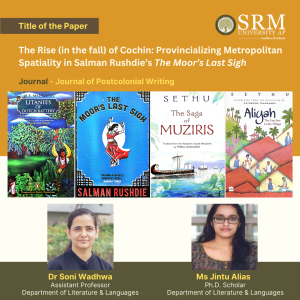 In a remarkable achievement, Dr Soni Wadhwa, Assistant Professor in the Department of Literature and Languages at SRM University-AP, and Ms Jintu Alias, a PhD Scholar, have made a significant contribution to the field of postcolonial studies with their paper titled “The rise (in the fall) of Cochin: Provincializing metropolitan spatiality in Salman Rushdie’s The Moor’s Last Sigh.”
In a remarkable achievement, Dr Soni Wadhwa, Assistant Professor in the Department of Literature and Languages at SRM University-AP, and Ms Jintu Alias, a PhD Scholar, have made a significant contribution to the field of postcolonial studies with their paper titled “The rise (in the fall) of Cochin: Provincializing metropolitan spatiality in Salman Rushdie’s The Moor’s Last Sigh.”
The paper, published in the highly esteemed Journal of Postcolonial Writing offering a fresh perspective on Salman Rushdie’s acclaimed novel, “The Moor’s Last Sigh.” Through their insightful analysis, Dr Wadhwa and Alias challenge the conventional notions of metropolitan spatiality and provide a nuanced understanding of the provincial city of Cochin.
Dr Soni Wadhwa and Jintu Alias, a promising PhD Scholar, have meticulously analysed Rushdie’s The Moor’s Last Sigh, shedding light on the complex dynamics of metropolitan spatiality and the rise and fall of Cochin within the narrative.
Their research explores Rushdie’s portrayal of Cochin, challenging traditional notions of metropolitan spaces and offering a fresh perspective on the provincial nation of such spatialities. This groundbreaking analysis delves deep into the layers of cultural, historical, and socio-political contexts within Rushdie’s work, showcasing the authors’ keen insights and critical thinking.
The publication of this paper highlights the invaluable contributions of our faculty and scholars in the field of literature and postcolonial studies. It is a testament to the rigorous academic environment and the commitment to excellence fostered at SRM University-AP.
We extend our warmest congratulations to Dr Soni Wadhwa and Jintu Alias for their remarkable achievement. Their dedication to research and passion for exploring the nuances of literature continue to inspire us all.
Explanation of the Research in Layperson’s Terms
Bombay/Mumbai is a great city widely celebrated in literature, especially for its cosmopolitanism. Salman Rushdie’s novel The Moor’s Last Sigh has been read by various critics for the richness of the portrayal of Mumbai. In their research, PhD scholar Jintu Alias and her PhD supervisor Dr Soni Wadhwa have analysed the representation of Cochin in the novel. Regarding their research they say, “For very long, Cochin’s presence has been eclipsed by that of Mumbai. But there is more to the novel than Bombay’s history. Like any art or literature, this novel is open to multiple interpretations. Our study is focused on the depiction of space in postcolonial literature with a focus on the island city Cochin in Kerala. When we immersed ourselves into the novel, we found that its charm is irresistible. Rushdie primarily opened a new city for other writers to explore. This novel was followed by several more novels that took an even closer look at the history of Cochin (now Kochi).”
Abstract
Indian fiction and critical engagements with it have a metropolitan bias. The preference for representations of big cities such as Mumbai in fiction means that non-metropolitan (“provincial”) spaces in India face neglect, literary and otherwise. This article argues for provincialising Indian fiction by exploring non-metropolitan locations as imagined in works of fiction to unpack alternative spatiality. The example offered is Salman Rushdie’s The Moor’s Last Sigh. In most readings of the novel, Bombay (along with Moorish Spain) is highlighted as a metropolitan model for India. Cochin does not figure in these readings, which are passed over as if just a random background or setting for the characters to be launched into Mumbai. This article addresses Cochin’s marginalisation by investigating how the island city offers a provincial, alternative, non-metropolitan theorisation of spatialities in Indian fiction. The larger objective is to make space for similarly marginalised non-European locales in the discourse of cosmopolitanism.
Social Implications
- We hope that with this interpretation of the novel from the point of view of Cochin and its history and cosmopolitanism, smaller cities in India get more attention from literary critics.
- We also hope that our research excites further studies and creative writing on other aspects of cultural traditions practised in smaller cities in India. There are many more themes and historical and geographical settings to explore in Indian literature!
Future Research
In continuation of our method of reading different Kochi texts, we will engage with more novels in the future. Our previous reading of another Kochi novel was published in Modern Jewish Studies in September 2023. We look forward to strengthening this body of work in the future.
About This Collaboration
PhD scholar Ms Jintu Alias and Assistant Professor Dr Soni Wadhwa have been working on this area of the Kochi novel since May 2021. This has been an exciting spatiality project in the context of Indian literature.
Citation
Alias, J., & Wadhwa, S. (2024). The rise (in the fall) of Cochin: Provincializing metropolitan spatiality in Salman Rushdie’s The Moor’s Last Sigh. Journal of Postcolonial Writing, 1-13. https://doi.org/10.1080/17449855.2024.2307408
- Published in Departmental News, English Current Happenings, News, Research News
Scholarly Exploration into Nuanced Portrayal of Human Experiences
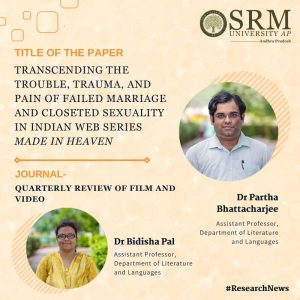 Dive into the realms of contemporary literature as our esteemed faculty members, Dr Partha Bhattacharjee and Dr Bidisha Pal from the Department of Literature and Languages presented their latest research endeavor. Their collaborative paper, titled “Transcending the Trouble, Trauma, and Pain of Failed Marriage and Closeted Sexuality in Indian Web Series Made in Heaven,” has found its home in the prestigious journal “Quarterly Review of Film and Video” (Scopus Q2).This scholarly exploration take into the portrayal of human experiences in the context of failed relationships and concealed identities within the framework of Indian web series. Join us in celebrating their insightful contributions to the literary discourse, reflecting SRM AP’s commitment to advancing knowledge and fostering academic excellence.
Dive into the realms of contemporary literature as our esteemed faculty members, Dr Partha Bhattacharjee and Dr Bidisha Pal from the Department of Literature and Languages presented their latest research endeavor. Their collaborative paper, titled “Transcending the Trouble, Trauma, and Pain of Failed Marriage and Closeted Sexuality in Indian Web Series Made in Heaven,” has found its home in the prestigious journal “Quarterly Review of Film and Video” (Scopus Q2).This scholarly exploration take into the portrayal of human experiences in the context of failed relationships and concealed identities within the framework of Indian web series. Join us in celebrating their insightful contributions to the literary discourse, reflecting SRM AP’s commitment to advancing knowledge and fostering academic excellence.
Abstract
Premiered as a television web series on Amazon Prime Video on 8th March 2019, Made in Heaven (2019) simultaneously unmasks the hypocrisies and lies of the big fat Indian weddings and breaks the taboo of homosexuality. In consecutive nine episodes, the plots and the subplots are beaded together to initiate a sensory sensitization towards the hypocrisy of marriages and insensitive homophobia. Carefully analyzing postulates from theorists this short article attempts to decode the trouble, trauma, and pain encoded in messy lifestyles, marriages, and relationships characterizing and wielding the lives as well as the sexuality of the characters in the web series
Explanation in Layperson’s Terms
The research revolves around the concept of marriage in Indian society as well as homosexuality in the Indian Hindi web series Made in Heaven (2019). The research shows how the various episodes of the web series showcase different aspects of marriage and the actual reality behind the pomp and pleasure of high-profile weddings within society. On the other hand sexuality and sexual desire are often hidden and do not get proper channelization in a person’s life. The desire thus remains suppressed and results in crisis in many forms. There are other intertwined concerns such as the dowry system, social disparity, impotency, virginity, and sexual molestations which weave a meta-narrative on the popular medium and raise consciousness regarding how people should react to those hazards and behave accordingly.
Practical Implementation and Social Implications of the Research
The research involves practical aspects such as the dowry system, social disparity, impotency, virginity, and sexual molestations which are part of our social lives. Many people have to face such things in their day-to-day lives. This research brings out such realities of society while analyzing the mental condition and psychology behind these. Moreover, this research also shows marriage is an important decision in a person’s life, it should be made in terms of love and respect, not based upon money and social status. The research visits practical examples and revisits the laws to substantiate the arguments. Popular media such as web series is not just a form of entertainment, but it can be a medium for building awareness.
- Published in English Current Happenings, News, Research News
Intellectual realm of Vaishnava Philosophy and Poetic Aesthetics
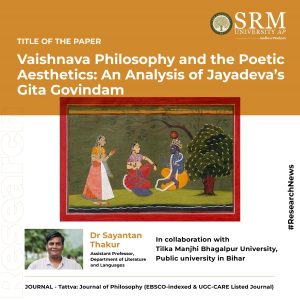 Dr Sayantan Thakur, Assistant Professor in the Department of Literature & Languages have published his research paper, ‘Vaishnava Philosophy and the Poetic Aesthetics: An Analysis of Jayadeva’s Gita Govindam‘ in Tattva: Journal of Philosophy, an esteemed EBSCO-indexed and UGC-CARE Listed Journal. Dr Thakur’s work embodies the spirit of academic rigor and philosophical inquiry. Join us in traversing the landscapes of wisdom, where intellect meets aesthetics, and knowledge transcends boundaries. Explore the rich tapestry of ideas that define SRM University-AP‘s commitment to intellectual excellence.
Dr Sayantan Thakur, Assistant Professor in the Department of Literature & Languages have published his research paper, ‘Vaishnava Philosophy and the Poetic Aesthetics: An Analysis of Jayadeva’s Gita Govindam‘ in Tattva: Journal of Philosophy, an esteemed EBSCO-indexed and UGC-CARE Listed Journal. Dr Thakur’s work embodies the spirit of academic rigor and philosophical inquiry. Join us in traversing the landscapes of wisdom, where intellect meets aesthetics, and knowledge transcends boundaries. Explore the rich tapestry of ideas that define SRM University-AP‘s commitment to intellectual excellence.
Abstract
Literature finds the best expression when literary aesthetics and philosophy run side by side. The former offers the external charm, while the latter inculcates the more profound implication with the aim of providing it with a superior stature and permanence. Jayadeva’s Gitagovindam, being a colossal work in the field of Vaishnava literature, does contain the brilliant juxtaposition of both. This article attempts to show how Jayadeva’s Gitagovindam, a colossal work in the field of Vaishnava literature, does contain the brilliant juxtaposition of both. On the one hand, like a typical lyrical poem, its melodic nature does have a soothing effect and on the other, the use of philosophy instils in it a greater depth and seriousness to uplift itself as a book of devotion and religious inspiration. Moreover, the importance of this Holy Scripture lies in the fact that it not only played a significant role in paving the way to form a new sect in the Vaishnava religion, known as ‘Gaudiya Vaishnavism’, but also showed the later Vaishnava lyricists the art of portraying in words the amorous love of Lord Krishna and Radha with compassion and tears.
Practical implementation and social implications of the research
Cultural Preservation: Understanding and analysing ancient texts like the Gitagovindam helps in preserving cultural and religious heritage. This research can contribute to the preservation and understanding of Vaishnava philosophy and its cultural significance.
Literary Understanding: Analysis of the text can provide insights into the interplay between philosophy and aesthetics in literature. It can be used as a tool for students, scholars, and enthusiasts to comprehend how profound thoughts are conveyed through art and literature.
Religious Studies: It will be valuable for religious scholars and practitioners, shedding light on the philosophical underpinnings of Vaishnavism. It can deepen the understanding of the religious sentiments associated with the worship of Lord Krishna.
Artistic Inspiration: By examining the poetic aesthetics the research might inspire contemporary artists, poets, and musicians in exploring similar thematic elements in their creations. It could lead to the creation of new artistic works that incorporate similar philosophical depth.
Community Understanding: Studies like mine can also bridge gaps in understanding between different communities by shedding light on the beliefs and values encapsulated in ancient texts. This understanding might foster better cultural appreciation and harmony.
Interdisciplinary Insights: The analysis might encourage interdisciplinary studies by merging literary analysis with philosophy, offering new avenues for exploration and collaboration between these fields.
Collaborations
Dr. Uday Kumar Mishra, Professor, Department of English, TMBU
Future Research Plans
- Regional Literature in Translation
- Tantric Tradition and Eastern Indian Literature,
- Folk Music of Bengal,
- Indian Philosophy, Aesthetics & Literature
Link to the Article
https://journals.christuniversity.in/index.php/tattva/article/view/3640/2480
- Published in Departmental News, English Current Happenings, News, Research News
Humanities lead to different career avenues
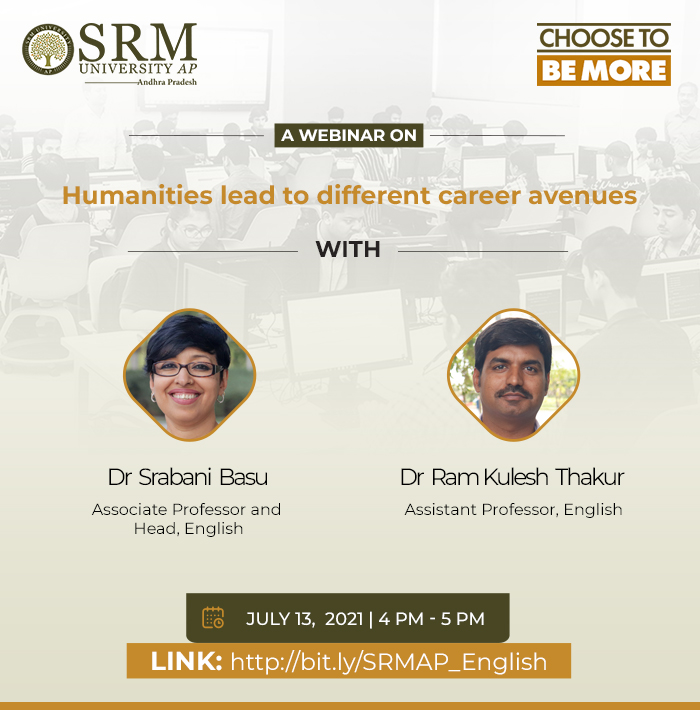 Humanities is the discipline that studies languages, histories and cultures. The BA English course at SRM University-AP offers students knowledge of the language and develops in them skills that foster their career paths. Dr Srabani Basu, Associate Professor and Head of the Department of English and Dr Ram Kulesh Thakur, Assistant Professor in the Department will explicate the course curriculum, subjects, scope, specialisation, and available job avenues of BA English course in a virtual session titled “Humanities lead to different career avenues” on July 13, 2021, at 4.00 pm.
Humanities is the discipline that studies languages, histories and cultures. The BA English course at SRM University-AP offers students knowledge of the language and develops in them skills that foster their career paths. Dr Srabani Basu, Associate Professor and Head of the Department of English and Dr Ram Kulesh Thakur, Assistant Professor in the Department will explicate the course curriculum, subjects, scope, specialisation, and available job avenues of BA English course in a virtual session titled “Humanities lead to different career avenues” on July 13, 2021, at 4.00 pm.
Students pursuing BA English at SRM-AP develop an insight into the culture of the English-Speaking communities across the world. This three-year undergraduate course intends to help students comprehend the significance of Indian and world literature. The programme puts equal emphasis on classroom lectures, practical job-oriented electives, publishing research papers, internships etc. After earning a bachelor’s degree in English, you can work as a writer, academic, journalist, in advertising, publishing, public relations, television, or in the film industry, among other professions.
SRM University-AP aims to produce graduates who are skilled and wield opportunities in the competitive world. If you desire to pursue BA in English from SRM University-AP, attend this exclusive webinar titled “Humanities lead to different career avenues” on July 13, 2021, at 4.00 pm.
Register here: https://srmap.zoom.us/webinar/register/WN_sD4UnFKeSLyNvToZ2C7mzA
- Published in Admission Events - Domestic, English, English Current Happenings, Events
Jairam Ramesh: On the journey of writing
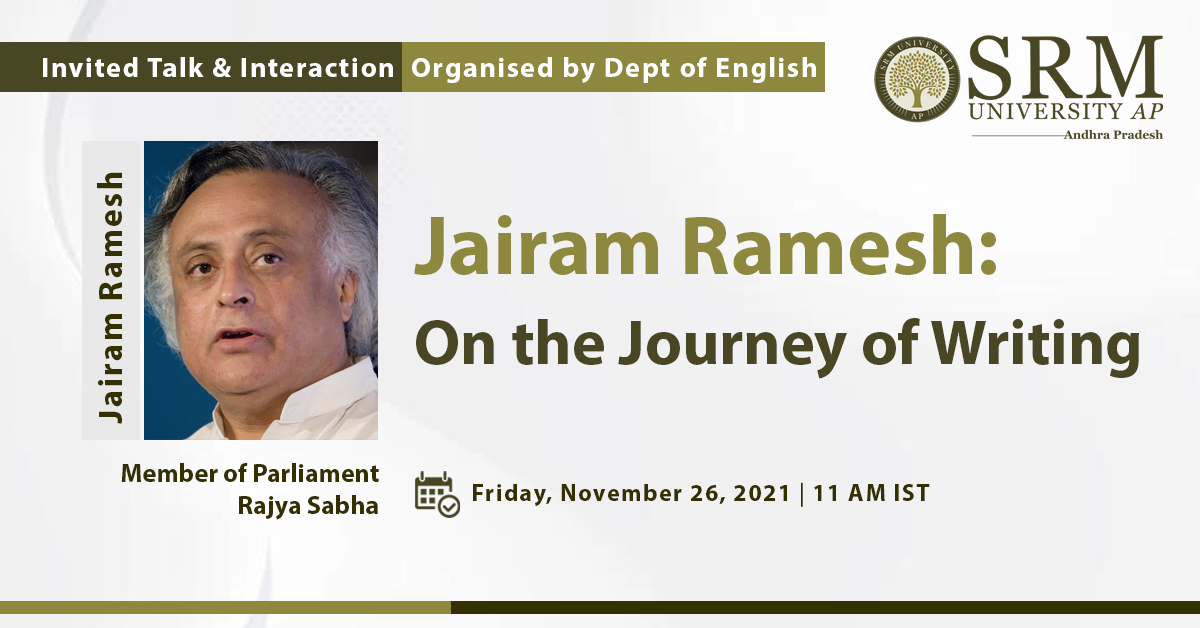 The Department of English at SRM University-AP invites you to an engaging webinar on November 26, 2021, at 11.00 am. Mr Jairam Ramesh, Member of Parliament representing the state of Andhra Pradesh, will be the guest speaker of the day.
The Department of English at SRM University-AP invites you to an engaging webinar on November 26, 2021, at 11.00 am. Mr Jairam Ramesh, Member of Parliament representing the state of Andhra Pradesh, will be the guest speaker of the day.
Writing is a process of pain and pleasure. Every writer approaches, experiences, and survives it in a unique way. In this talk and interaction, Mr Jairam Ramesh would share his idea and process of writing. His talk would be followed by an interaction about his latest book The Light of Asia: The Poem That Defined The Buddha (Penguin, 2021). The talk is intended to be a part of the Department’s larger initiative to organise interactions around “Language and Society” to address all kinds of conversations about language, communication, writing, speaking, thinking, and at a deeper level, about connecting with others.
About the Speaker:
Jairam Ramesh is presently a Member of Parliament and Chairman of Parliament’s Standing Committee on Science and Technology, Environment, Forests and Climate Change. He was Union Minister between 2006 and 2014 and held several portfolios including Commerce, Power, Environment and Forests, Drinking Water and Sanitation and Rural Development. He played a key role in global climate change negotiations in 2009 and 2010. He is also the author of several well-known books some of which are Green Signals: Ecology, Growth and Democracy in India, Old History, New Geography: Bifurcating Andhra Pradesh, To the Brink and Back: India’s 1991 Story, Indira Gandhi: A Life in Nature, Intertwined Lives: PN Haksar and Indira Gandhi, A Chequered Brilliance: The Many Lives of V.K. Krishna Menon and The Light of Asia: The Poem that defined the Buddha.
We encourage you to make use of this exclusive opportunity to interact with Mr Jairam Ramesh and understand the nuances of the writing process on November 26, 2021, at 11.00 am.
- Published in Departmental Events, English, English Current Happenings, Events, Webinars
Reading Skills: Insights from a Historian
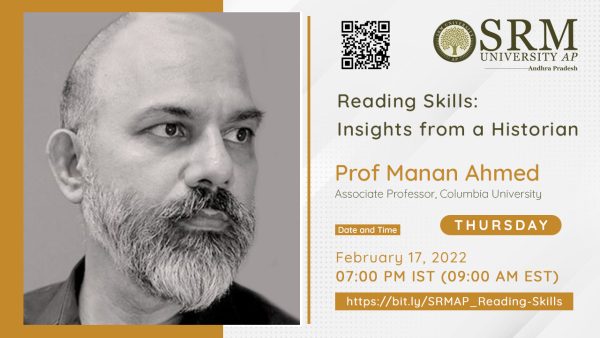 Reading means something different for everyone. Each person develops their reading skills as per their requirements. Some read to find information while others read to mine information. Some read to learn, and some read to laugh, some read to be entertained and some to escape. From reading the labels on new products to newspapers to novels, the objectives of reading can be plenty.
Reading means something different for everyone. Each person develops their reading skills as per their requirements. Some read to find information while others read to mine information. Some read to learn, and some read to laugh, some read to be entertained and some to escape. From reading the labels on new products to newspapers to novels, the objectives of reading can be plenty.
The Department of English is bringing Prof Manan Ahmed – Associate Professor, Columbia University to shed light on the reading approach and the reading skills of a historian in an interesting and interactive session.
Date: February 17, 2022
Time: 07.00 pm IST
About the Speaker:
Manan Ahmed, Associate Professor of History at Columbia University in the City of New York, is a historian of South Asia and the littoral western Indian Ocean world from 1000-1800 CE. His areas of specialisation include intellectual history in South and Southeast Asia, critical philosophy of history, colonial and anti-colonial thought. Two of his books The Loss of Hindustan: The Invention of India (2020) and A Book of Conquest: The Chachnama and Muslim Origins in South Asia (2016) are published by Harvard University Press.
Abstract:
“Reading Skills” brings to mind dreadful reading comprehension passages given in schools and courses in communication skills. However, reading is much more about finding answers to given questions. It is about finding the questions to ask of a passage, blog, article, literary texts, and historical texts. In this talk and interaction, Prof Manan Ahmed would walk us through a historian’s approach to reading. The programme is intended to be a part of the department’s larger initiative to organise interactions around “Language and Society” to address all kinds of conversations about language, communication, writing, speaking, thinking, and at a deeper level, about connecting with others.
Click here to join this exclusive session and develop an insight on reading through the experiences of our esteemed speaker.
- Published in Departmental Events, English, English Current Happenings, Events
- 1
- 2


